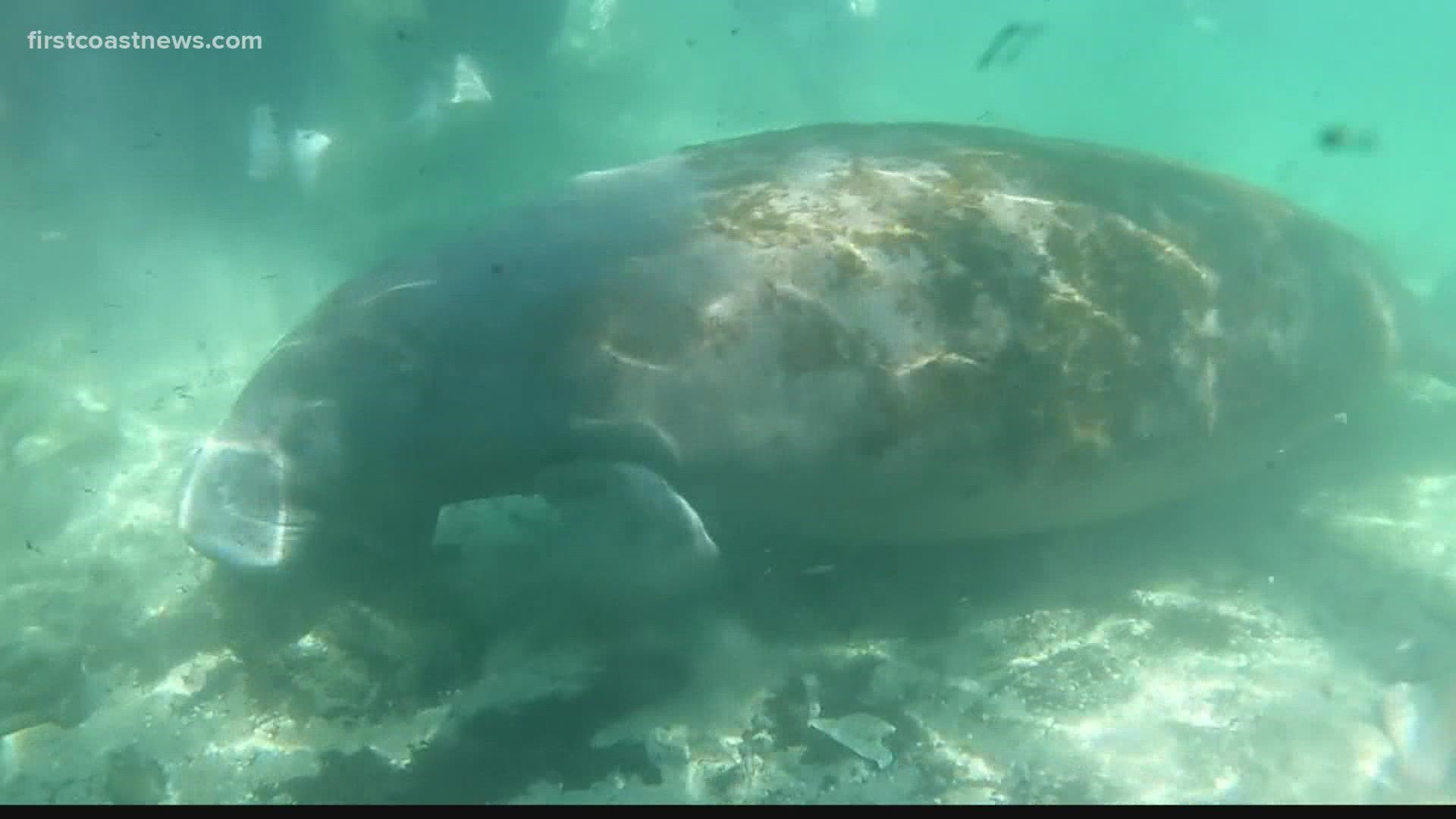JACKSONVILLE, Fla — With lawsuits filed, legislation pending and a Florida mascot dying at a record rate, the world is watching what Florida does next as its manatees starve.
Manatees are in crisis. The Florida Fish and Wildlife Conservation Commission reports more than 1,100 died in 2021, double the average.
They're starving to death.
"There isn't enough food near the warm water source," said Craig Miller, curator of mammals at Jacksonville Zoo’s Manatee Critical Care Center. "They're either faced with either starving or going further in the cold water to feed, and that's where they get cold stress."
It's been declared an 'Unusual Mortality Event' which means more manatees are ending up at the zoo's critical care center. Miller says they've treated more in the past year than ever before, and they're full.
As the manatees huddle for warmth during the winter, crowds huddle to see them in areas like Blue Spring State Park.
When First Coast News Reporters Leah Shields and Renata Di Gregorio got out on the water in a canoe, there were more than 600 manatees in the springs, a record number.
The sight of so many manatees is a glimmer of hope, but experts say these moments are fleeting. The manatees' habitats and food sources are being destroyed.
"We are at a critical moment," said Lisa Rinaman with St. Johns Riverkeeper. "If we do not turn around the health of these waterways that will foster regrowth of these important grasses, we are going to lose our manatee population."
Seagrass is a manatee's main food source. What's killing it is us: pollution from fertilizers and septic tanks feed the growth of toxic algae, which blocks sunlight and prevents the seagrass from growing.
The algae is blamed for more than half of Florida manatee deaths last year.
"Right now, the rules don't protect the river and it's all about disposal instead of a long-term solution," said Rinaman.
Further north on the St. Johns in October 2021, the St. Johns Riverkeeper found the level of algae bloom toxins 300 times higher than the safe level for swimming.
Further south in the Indian River Lagoon, the water management district says nearly 50,000 acres of seagrass-- vanished.
"We need to do everything we can to help restore the food sources in the Indian River Lagoon and help relieve that population, but also prevent a crisis here in the St. Johns River," Rinaman said.
Manatee advocates are now suing the Environmental Protection Agency, claiming that when it comes to water quality standards, they're doing the exact opposite of their name.
In December, an unprecedented program to save the manatees began.
Feeding manatees is illegal under state and federal law, but teams with U.S. Fish and Wildlife Service and Florida Fish and Wildlife Conservation Commission have permission to feed the manatees.
They are distributing thousands of pounds of romaine lettuce near the Cape Canaveral power plant.
FWC officials say the manatees are eating, but will it be enough?
More than 260 manatees have died through the second week of February. That number increases every week.
"We need to all take personal responsibility for protecting Florida's wildlife and Florida's manatees because every little bit helps, but we also have to have protective policies at the state and federal level," Rinaman said.
"We're seeing grasses disappear from over development, overconsumption, as well as too much nutrient pollution going in, and we can all do our part. But we also have to hold our government to do their part," she said.
When you dive deeper, it becomes crystal clear. This is about more than the manatees.
"It's not just about manatees," Miller said. "It's about the entire ecosystem. We're saving the ecosystem... we're really saving ourselves. No doubt about that."
For more on what you can personally do to help save the manatees, FWC has a list of how you can improve water quality.
- Eliminate the use of lawn chemicals (e.g., fertilizer, pesticide)
- Pick up dog waste
- Don’t blow leaves and grass clippings into the street or gutters; leave them on your lawn
- Wash your car on the grass or use a commercial car wash
- Switch from septic systems to municipal sewer
- Update and repair septic systems if municipal sewer is unavailable
- Plant a Florida native yard: https://myfwc.com/viewing/habitat/certify/
- Participate in living shoreline restoration of oysters and mangroves

